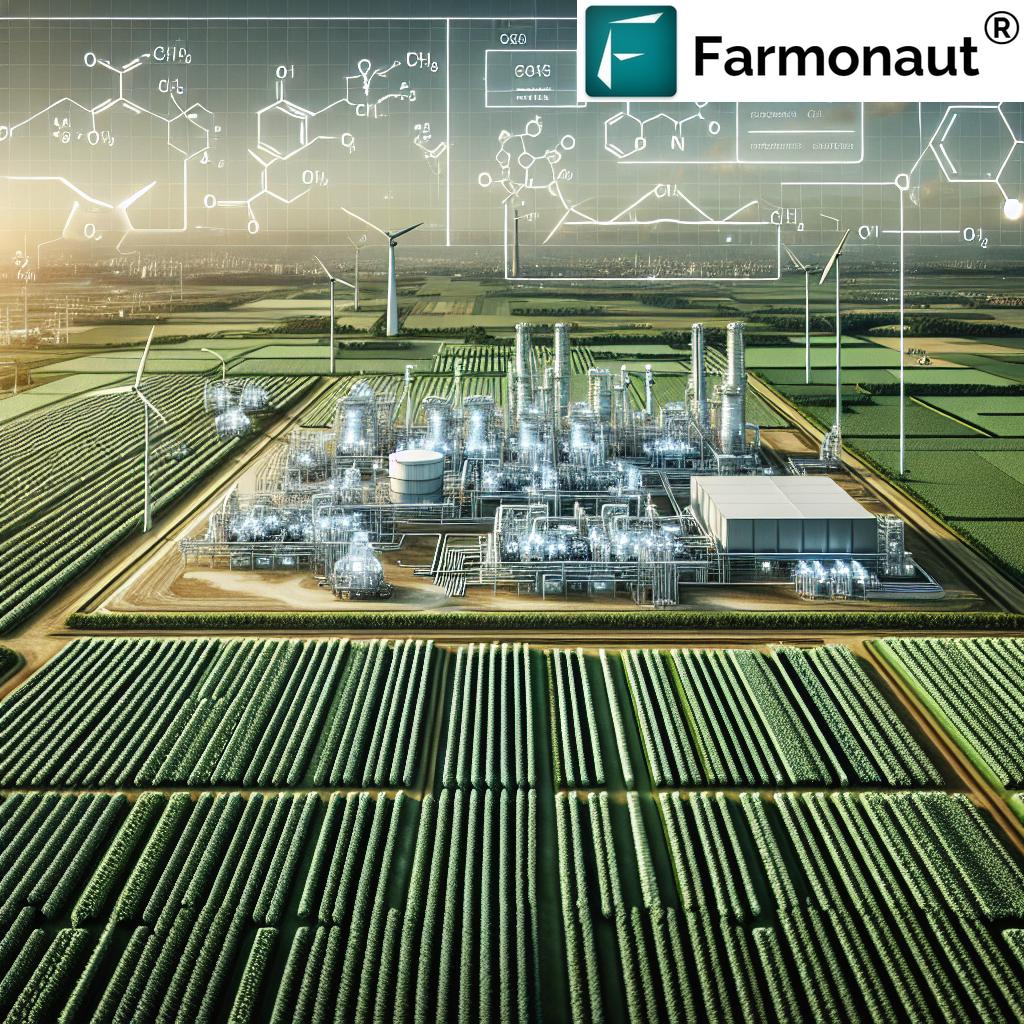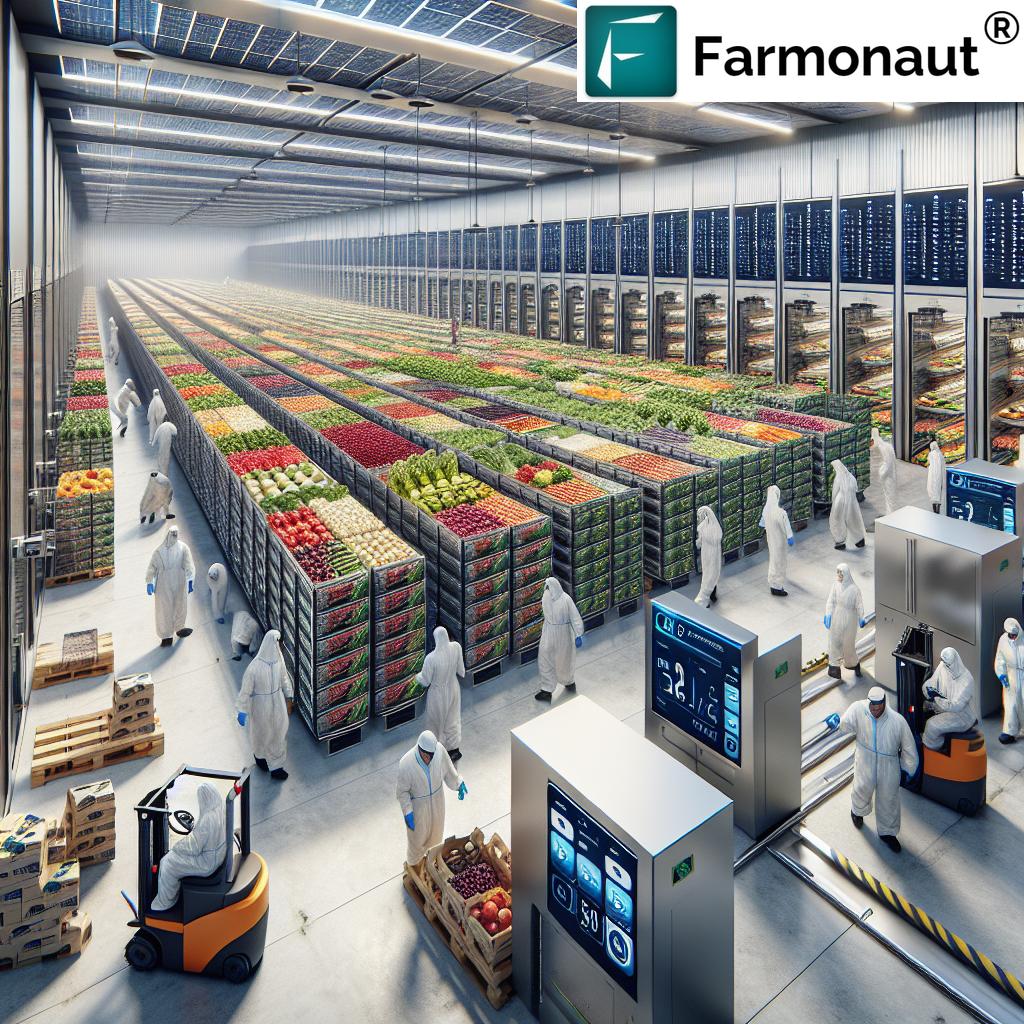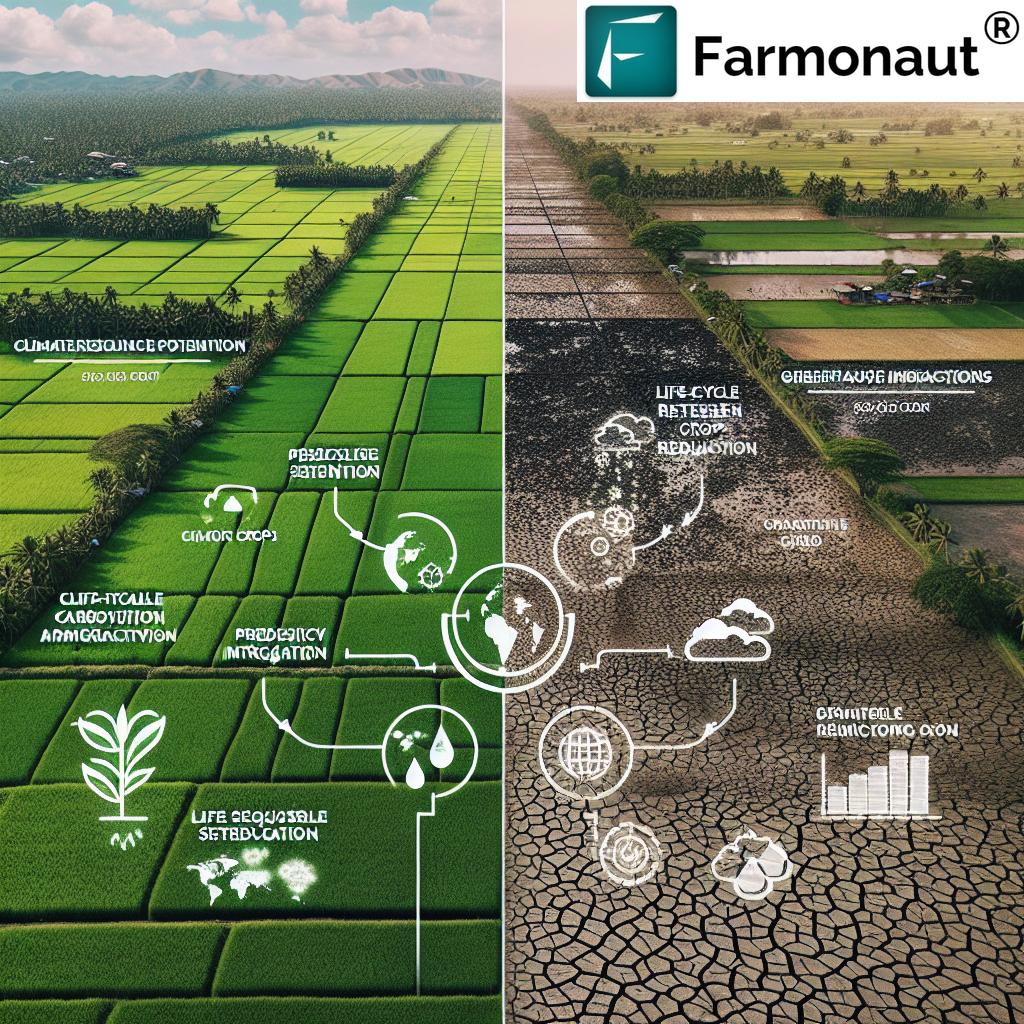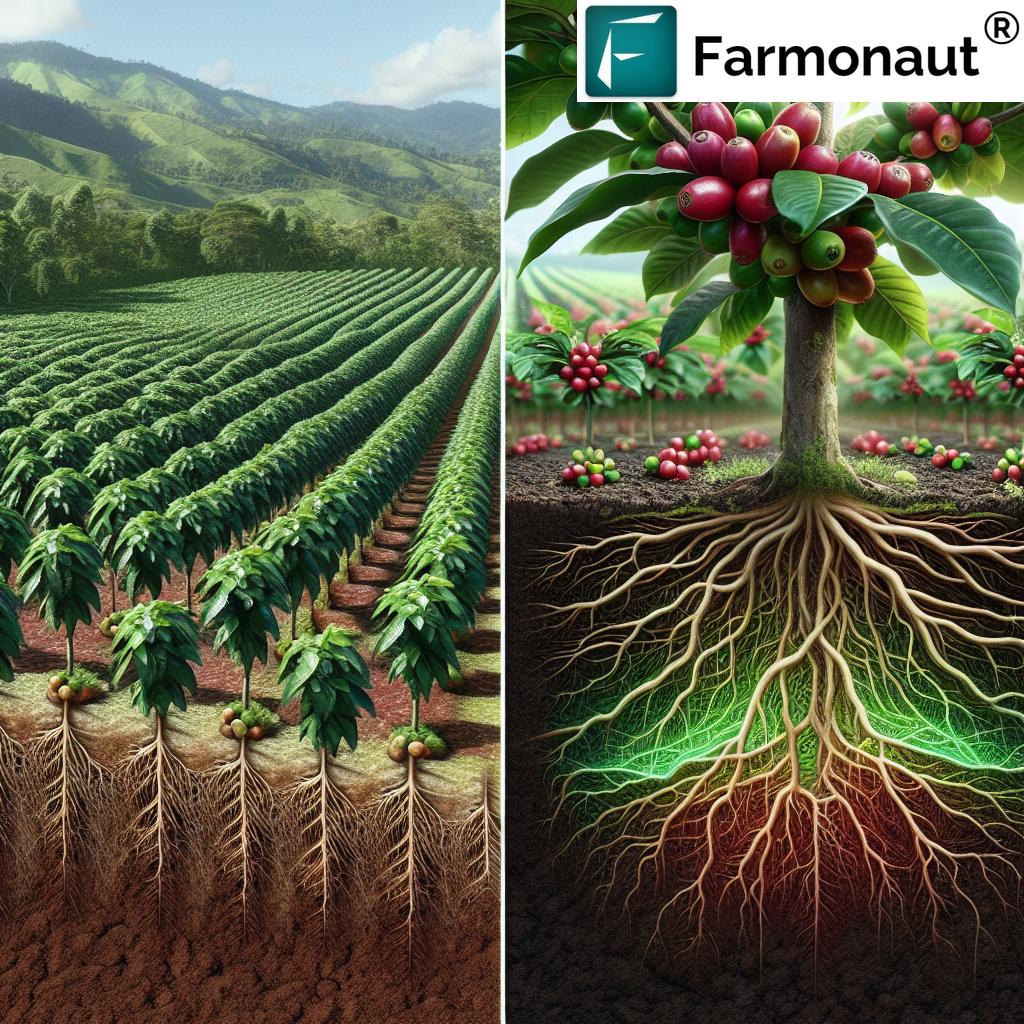Revolutionizing Sustainable Ammonia: Kazakhstan’s Innovative Fertilizer Complex Boosts Food Security
“Kazakhstan’s new fertilizer complex aims to produce sustainable ammonia, potentially reducing carbon emissions by millions of tons annually.”
In the heart of Central Asia, a groundbreaking project is set to transform the landscape of sustainable agriculture and food security. We are witnessing the dawn of a new era in fertilizer production as Kazakhstan embarks on an ambitious journey to establish its first world-scale fertilizer complex. This innovative venture not only promises to revolutionize sustainable ammonia production but also stands as a beacon of hope for enhancing food security across the region and beyond.

As we delve into the intricacies of this monumental project, it’s crucial to understand the significance of sustainable ammonia production in the context of global agriculture and food security. Ammonia, a key component in fertilizer manufacturing, plays a pivotal role in boosting crop yields and ensuring food availability for the growing global population. However, traditional ammonia production methods have long been associated with high carbon emissions and environmental concerns.
The Dawn of a New Era in Fertilizer Production
The announcement of Kazakhstan’s pioneering fertilizer complex marks a significant milestone in the quest for sustainable agricultural practices. This world-class facility, set to be established in Aktau, is not just another industrial project; it represents a confluence of cutting-edge technology, innovative engineering, and a commitment to environmental stewardship.
At the heart of this ambitious venture lies an ammonia plant with a staggering production capacity of 2,000 metric tons per day. This scale of production is set to position Kazakhstan as a major player in the global fertilizer market while simultaneously addressing critical food security challenges in the region.
Innovative Technology at the Core
The cornerstone of this revolutionary complex is the implementation of advanced ammonia technology. The project leverages KBR’s innovative Purifier™ ammonia technology, a state-of-the-art solution designed to optimize operational efficiency while significantly reducing carbon emissions compared to conventional ammonia production methods.
This technological marvel is not just about increasing production capacity; it’s about redefining the very essence of sustainable ammonia production. By integrating cutting-edge engineering services and green fertilizer solutions, the complex aims to set new benchmarks in operational efficiency and environmental responsibility.
Enhancing Food Security Through Innovation
The implications of this project extend far beyond the borders of Kazakhstan. By bolstering the country’s fertilizer production capabilities, the complex is poised to play a crucial role in enhancing food security across Central Asia and neighboring regions. The increased availability of high-quality, sustainably produced fertilizers is expected to boost agricultural productivity, leading to improved crop yields and greater food availability.
In the realm of agricultural technology advancements, this project stands as a testament to the power of innovation in addressing global challenges. The integration of advanced science and engineering in fertilizer production opens new avenues for sustainable agriculture practices, potentially transforming the way we approach food production on a global scale.
A Comprehensive Approach to Sustainable Development
The fertilizer complex development in Kazakhstan is not merely about constructing a production facility; it’s about creating a sustainable ecosystem that addresses multiple facets of agricultural and environmental challenges. Let’s explore the key components that make this project a holistic approach to sustainable development:
- Low Carbon Ammonia Technology: At the core of the project is the implementation of low carbon ammonia technology. This innovative approach significantly reduces the carbon footprint associated with ammonia production, aligning with global efforts to combat climate change.
- Efficient Ammonia Plant Design: The plant’s design incorporates the latest advancements in engineering, ensuring optimal resource utilization and minimal waste generation. This efficient design not only boosts productivity but also contributes to the overall sustainability of the operation.
- Green Fertilizer Solutions: The complex aims to produce fertilizers that not only enhance crop yields but also minimize environmental impact. These green fertilizer solutions represent a significant step towards more sustainable agricultural practices.
- Agritech Engineering Services: The project integrates advanced agritech engineering services, leveraging data-driven approaches and precision agriculture techniques to optimize fertilizer application and crop management.
“The world-scale fertilizer facility in Kazakhstan is expected to increase global food security for millions of people through advanced agritech solutions.”
Technological Synergies: Farmonaut’s Role in Modern Agriculture
While discussing technological advancements in agriculture, it’s worth noting the role of innovative platforms like Farmonaut in complementing such large-scale industrial projects. Farmonaut, a pioneering agricultural technology company, offers advanced satellite-based farm management solutions that align well with the goals of sustainable agriculture and food security.
Through its web application and mobile apps available on Android and iOS, Farmonaut provides farmers with real-time crop health monitoring, AI-based advisory systems, and resource management tools. These technologies complement the efforts of large-scale fertilizer production by ensuring efficient and targeted use of agricultural inputs.

The Global Impact of Kazakhstan’s Fertilizer Complex
The establishment of this world-scale fertilizer complex in Kazakhstan is set to have far-reaching implications for the global agricultural landscape. Here’s how this innovative project is poised to make a significant impact:
- Boosting Regional Food Security: By increasing the availability of high-quality fertilizers, the complex will directly contribute to improved crop yields in Kazakhstan and neighboring countries, enhancing food security in the region.
- Setting New Industry Standards: The implementation of cutting-edge technology and sustainable practices in this project sets a new benchmark for the global fertilizer industry, potentially influencing future developments worldwide.
- Reducing Global Carbon Footprint: The adoption of low carbon ammonia technology in such a large-scale facility can significantly reduce the overall carbon emissions associated with global fertilizer production.
- Promoting Sustainable Agriculture: The availability of green fertilizer solutions will encourage farmers to adopt more sustainable agricultural practices, contributing to long-term environmental conservation.
- Driving Economic Growth: Beyond its environmental and agricultural benefits, the project is expected to boost Kazakhstan’s economy, creating jobs and fostering technological innovation in the region.
Comparative Analysis: Traditional vs. Innovative Ammonia Production
To fully appreciate the significance of Kazakhstan’s new fertilizer complex, it’s essential to compare it with traditional ammonia production methods. The following table provides a clear comparison, highlighting the advancements and benefits of the innovative approach:
| Production Method | Carbon Footprint (estimated CO2 emissions per ton) | Energy Efficiency (estimated energy used per ton) | Food Security Impact (qualitative rating) |
|---|---|---|---|
| Traditional Ammonia Production | 1.5 – 3 tons CO2 | 30 – 35 GJ | Moderate |
| Kazakhstan’s Innovative Complex | 0.5 – 1 ton CO2 (estimated) | 25 – 28 GJ (estimated) | High |
This comparison clearly illustrates the significant improvements in environmental impact and efficiency offered by the innovative approach adopted in Kazakhstan’s new fertilizer complex. The reduced carbon footprint and increased energy efficiency not only contribute to sustainability goals but also translate into more cost-effective production, potentially making fertilizers more accessible to farmers.
The Role of Technology in Sustainable Agriculture
The development of Kazakhstan’s fertilizer complex is a prime example of how technology is reshaping the agricultural landscape. However, it’s important to note that technological advancements in agriculture extend beyond large-scale industrial projects. Companies like Farmonaut are playing a crucial role in bringing precision agriculture to farmers of all scales.
Farmonaut’s satellite-based crop health monitoring and AI-driven advisory systems complement the efforts of fertilizer producers by ensuring that these agricultural inputs are used efficiently. Through its API and developer documentation, Farmonaut also enables other agritech companies to integrate advanced monitoring capabilities into their solutions, further expanding the reach of precision agriculture technologies.
Challenges and Future Prospects
While the Kazakhstan fertilizer complex project represents a significant leap forward in sustainable ammonia production and food security innovation, it’s important to acknowledge the challenges that lie ahead:
- Implementation Risks: As with any large-scale industrial project, there are inherent risks associated with implementation, including potential delays, cost overruns, and technical challenges.
- Market Adaptation: The success of the project will partly depend on how quickly the market adapts to and embraces the new, more sustainable fertilizer products.
- Regulatory Compliance: Ensuring ongoing compliance with evolving environmental regulations and sustainability standards will be crucial for the long-term success of the complex.
- Technology Integration: Seamlessly integrating advanced technologies and maintaining their efficiency over time will require ongoing investment and expertise.
Despite these challenges, the future prospects for this innovative fertilizer complex are promising. As the world increasingly focuses on sustainable solutions to global challenges, projects like this are likely to gain more support and recognition. The complex has the potential to serve as a model for future developments in the fertilizer industry, inspiring similar initiatives worldwide.
The Path Forward: Integrating Innovation Across the Agricultural Value Chain
The establishment of Kazakhstan’s innovative fertilizer complex is a significant step towards a more sustainable and food-secure future. However, it’s crucial to recognize that achieving true food security and agricultural sustainability requires a holistic approach that integrates innovation across the entire agricultural value chain.
This is where the synergy between large-scale industrial projects like the fertilizer complex and agritech solutions like Farmonaut becomes evident. While the complex focuses on sustainable production of essential agricultural inputs, platforms like Farmonaut ensure that these inputs are used efficiently at the farm level.
By leveraging satellite technology, AI, and data analytics, Farmonaut provides farmers with the tools they need to make informed decisions about fertilizer application, irrigation, and crop management. This precision approach not only maximizes the benefits of the innovative fertilizers produced by complexes like the one in Kazakhstan but also contributes to overall resource conservation and environmental sustainability.
Conclusion: A New Chapter in Sustainable Agriculture
The development of Kazakhstan’s world-scale fertilizer complex marks the beginning of a new chapter in sustainable agriculture and food security. By combining innovative ammonia production technologies with a commitment to environmental stewardship, this project sets a new standard for the global fertilizer industry.
As we look to the future, it’s clear that the path to global food security and sustainable agriculture will be paved with innovative solutions like this fertilizer complex and complementary agritech platforms. By embracing these advancements and fostering collaboration across the agricultural sector, we can work towards a future where food security is assured, and agricultural practices are in harmony with our planet’s ecological balance.
The journey towards sustainable ammonia production and enhanced food security is just beginning, and projects like Kazakhstan’s fertilizer complex are leading the way. As we continue to innovate and collaborate, the promise of a more sustainable and food-secure world comes ever closer to reality.
FAQ Section
- Q: What makes Kazakhstan’s new fertilizer complex innovative?
A: The complex utilizes cutting-edge Purifier™ ammonia technology, which significantly reduces carbon emissions and improves energy efficiency compared to traditional production methods. - Q: How will this project impact food security?
A: By increasing the availability of high-quality, sustainably produced fertilizers, the complex is expected to boost agricultural productivity and crop yields, enhancing food security in Kazakhstan and neighboring regions. - Q: What is the production capacity of the new ammonia plant?
A: The plant is designed to produce 2,000 metric tons of ammonia per day, making it a world-scale facility. - Q: How does this project contribute to sustainability goals?
A: The complex incorporates low carbon ammonia technology and green fertilizer solutions, significantly reducing the environmental impact of fertilizer production. - Q: What role does technology play in this project?
A: Advanced technology is at the core of this project, from the innovative ammonia production process to the integration of agritech engineering services for optimized operations.
As we conclude this exploration of Kazakhstan’s groundbreaking fertilizer complex, it’s clear that the future of sustainable agriculture is bright. By combining innovative technologies, commitment to sustainability, and a focus on food security, this project sets a new standard for the global agricultural industry. As we move forward, the integration of such large-scale innovations with precision farming technologies like those offered by Farmonaut will be crucial in addressing the world’s growing food demands while preserving our planet’s resources.
















